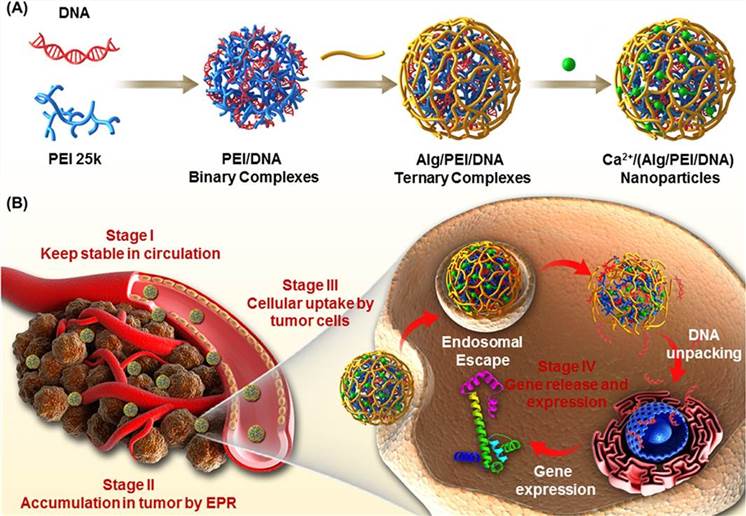Polyethylenimine-Based Nanocarrier Development
InquiryCD Formulation is a leading developer of non-viral nucleic acid delivery systems. We harness the transfection efficiency of polyethylenimine (PEI) but address its toxicity challenges through rational material design. We can tailor PEI derivatives through chemical modifications and conjugations to optimize biophysical properties for enhanced stability, targeting and controlled release of therapeutic payloads.
Characteristics of Cationic Polymer PEI Nanocarrier
Cationic polymers represented by PEI have shown promise as gene delivery carriers due to their ability to concentrate nucleic acids into nanoparticles and enter cells through endocytosis. PEI has high transfection efficiency due to its ability to buffer endosomal acidity, promote endosomal escape, and release genetic material into the cytoplasm. However, concerns over its toxicity remain a challenge given the production of reactive oxygen species during its interactions with physiological constituents, thus requiring modifications to enhance biocompatibility.
 Preparation of Ca2+/(Alg/PEI/DNA) nanoparticles and their process of transferring and releasing DNA at tumor sites (Zhang Y.; et al. 2018)
Preparation of Ca2+/(Alg/PEI/DNA) nanoparticles and their process of transferring and releasing DNA at tumor sites (Zhang Y.; et al. 2018)
What Nucleic Acid Drugs Can We Use PEI-Based Nanocarriers to Deliver?
- Plasmid DNA for gene therapy and DNA vaccines.
- mRNA for protein replacement therapies and vaccines.
- siRNA for treatment of diseases through RNA interference.
- RNA and antisense oligonucleotides for the regulation of gene expression.
- CRISPR/Cas9 components for genome editing therapies.
- Nucleic acid aptamers for molecular targeting.
What Types of PEI-Based Nanocarriers Can We Develop?
Although PEI is qualified as a gene carrier, unmodified PEI still has some disadvantages, such as cytotoxicity and aggregation under strong ionic conditions, which limits its effect. At CD Formulation, our scientists research and develop various polymers and ligands to modify PEI with the aim of changing the physical and chemical properties of PEI, thereby improving biocompatibility and transfection efficiency.
PEI can form complexes directly with nucleic acids such as DNA or RNA. In addition, we can also add other components such as cholesterol and negatively charged polysaccharides (sodium alginate) to the complex system to specifically improve the transfection efficiency and tumor accumulation of PEI/nucleic acid complexes.
- Polysaccharide Modified PEI
Derivatizing PEI with polysaccharides such as chitosan and hyaluronic acid enhances targeting of mucous membranes and cell surfaces, aided by their mucoadhesive properties.
- PEG Modified PEI (Stealth PEI Conjugate)
Through our research and testing, PEGylation of PEI can produce stealth nanocarriers that are not easily recognized by the immune system, with extended circulation time and reduced immunogenicity.
Conjugating hydrophobic moieties to PEI like fatty acids or alkyl chains facilitates the encapsulation of hydrophobic compounds within PEI nanostructures for optimized intracellular delivery.
We can functionalize PEI with specific ligands (such as antibodies, peptides or aptamers) to achieve targeted delivery to specific cells or tissues, enhancing the selectivity and binding affinity of PEI nanocarriers.
Advantages of Our PEI-Based Nanocarrier Development Services
- PEI-based nanocarriers protect nucleic acids from degradation in biological environments and maintain their integrity during delivery.
- Our nanocarriers can effectively deliver various types of nucleic acids, including plasmids, siRNA, miRNA, and antisense oligonucleotides, accommodating diverse therapeutic strategies.
- We can develop PEI-based nanocarriers suitable for various modes of administration for nucleic acid drug delivery, including injection, oral and mucosal administration.
- We can customize and optimize PEI nanocarriers according to customer needs to meet specific requirements and functions, including their size, physical and chemical properties, sustained release and controlled release functions.
With integrated capabilities in development, scale-up, and translational research, CD Formulation's PEI-based nanocarrier development services provide a complete solution from raw material synthesis to formulation design and functional evaluation. Our scientists would be happy to discuss how we can apply our platform technologies and solution-oriented approach to deliver your nucleic acid drugs safely and cost-effectively. Please feel free to contact us!
References
- Zhang Y.; et al. Ionic-crosslinked polysaccharide/PEI/DNA nanoparticles for stabilized gene delivery. Carbohydr Polym. 2018, 201:246-256.
- Zakeri A.; et al. Polyethylenimine-based nanocarriers in co-delivery of drug and gene: a developing horizon. Nano Rev Exp. 2018, 9(1):1488497.
- Pandey A.P.; et al. Polyethylenimine: A versatile, multifunctional non-viral vector for nucleic acid delivery. Mater Sci Eng C Mater Biol Appl. 2016, 68:904-918.
Related Services


 Preparation of Ca2+/(Alg/PEI/DNA) nanoparticles and their process of transferring and releasing DNA at tumor sites (Zhang Y.; et al. 2018)
Preparation of Ca2+/(Alg/PEI/DNA) nanoparticles and their process of transferring and releasing DNA at tumor sites (Zhang Y.; et al. 2018)